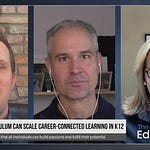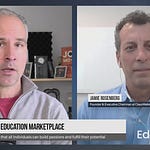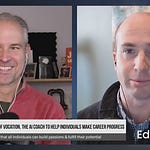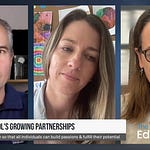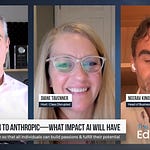Class Disrupted is back for season 7! In this kickoff episode, Diane Tavenner and Michael Horn reconnected after the summer to reflect on how artificial intelligence is shaping the education landscape. They discussed lingering skepticism about AI’s current use in schools and shared their evolving feelings about the technology. The hosts described their plans for the new season, which starts with a broad look at AI’s development both inside and beyond education, before narrowing in on entrepreneurs and real-world applications that could reinvent learning.
Diane Tavenner
Hey, Michael.
Michael Horn
Hey, Diane. It's good to see you.
Diane Tavenner
It's really good to see you. It's been, it's been a summer that it's funny to not spend as much time with you in the summer. So it's fun to be back. And I guess that's one of the bright spots of returning to the fall in addition to fall, which is, as you know, my favorite fall.
Michael Horn
It is its own magic right here in New England. This is like our best season, Diane. This is when, you know, apples, peaches, like we're, we're actually enjoying, you know, the, the limited harvest season compared to you people in California.
Diane Tavenner
Yes, we have, I will say we do have quite an abundant market right now, and we've been spending Sundays there. And I made a very delicious fig jam yesterday with the sort of end of the season figs. So it's been a quick, fun summer and now we're back this fall with a new season. Michael I can't believe it's season seven.
Michael Horn
Yeah, that's wild in itself. I guess we crammed a couple seasons in those first year and a half or something like that because it sort of whipped by during the pandemic and no one was counting years. But we are back by popular demand to focus on AI of all things, Diane and, you know, same thing theme of this podcast, right? We're not just interested in AI and education for its own sake, but really as a mechanism for rethinking what we have always viewed as a system built for its time, did amazing things in its time, but was never built to optimize each student's learning and chances of really owning their future, particularly in this era. There's a lot of change in this era right now in general in the external environment. So I think, you know, people have been saying we want more about this, follow your curiosity, and we have a lot of questions as well, right?
Diane Tavenner
We do. You know, we thought, I don't know what we were thinking in that miniseries, that we would just sort of figure it out and move on last season, but we did not. I think we just opened more and more curiosity. And so here we are again. And, you know, I think that we have a pretty exciting lineup of guests at least. I'm pretty excited to talk with them this year, and I think they're going to shed a lot of light on a bunch of the questions we have. But we also just want to keep having input from our listeners. So what is on your mind? Who do you want to hear from? What do you want us to talk about?
Please send those ideas our way. I hope this season, many of you who wrote in last season are going to find that we took some of your questions, suggestions, ideas, and we're going to try to bring those into the dialogue and conversation. And so we're super open to that. And, and we're thinking about this season a little bit. I guess we're going to start more broadly, Michael. So open the aperture a little bit, if you will, a little bit wider. We want to, you know, we always focus on K12 education. I think a couple of things about that this year.
One, we're going to be really specific when we're talking about younger people, middle school, high school, because those things seem to be playing out very differently.
Michael Horn
Yeah. And I think some pretty profound differences in last year we were pretty focused on that middle, high school segment. And yeah, I think that's just it. Right. Like the AI that's in your adaptive module to build additional skills very different from how you might use it in high school. Right. And so recognizing those differences, but also recognizing that higher ed and workforce have some pretty big implications on the system as well. And so we're not going to leave those out.
Diane Tavenner
No, not at all. And from my perspective, it's because I want to take more and more the position of what is the journey of the young person. And the young person's journey doesn't sort of have these stark lines between K12 and higher ed.
Michael Horn
Those are adult systems, those are not kids systems.
Exploring AI's Broader Landscape
Diane Tavenner
Exactly. And so, we'll be bringing all of those in when they make sense as we think about the journey of young people. And then, so we're going to start that, I think, with I guess, a little bit of a what's the landscape out there of AI? And you know, I think last season we talked about, we specifically sought out kind of cheerleaders and skeptics and we wanted to hear from those various perspectives. I think this year we're going to look, we're going to at least kick off the season looking at just the big picture in the landscape, like talking to some of the people who are working on the frontier models. We're going to actually turn outside of education for an episode to look at healthcare, which is this very interesting sort of parallel universe to education, and see what we can learn from that lens and ask some big questions about, like, what is happening across the board. And we think that as a result, we, you know, a little bit of forewarning here, we might be talking to people who are a little bit more on the optimistic side as a result. But we will of course keep, you know, a critical eye on the conversations that we're having.
Michael Horn
100% and on the note of optimism. So just so folks can start to envision the arc, we're not going to tell you every guest right now up front because, you know, there could be some changes. But if we're starting broad, we're starting with people who actually work at some of the companies that do the large language models, healthcare, as Diane said, folks that have sort of this 20,000-foot view of where AI is going more broadly. And then we're going to start to home in on the education use cases and we're going to go to entrepreneurs. So they're going to certainly be optimistic as well. That's in their nature. They see problems, they want to solve them by building something which is great and they will bring their lens. I will say, Diane, when I moved out to Silicon Valley in, What was that, 2008, 9 or something, and it feels a little bit like it did then, right when you were building the new Summit model in 2010, I guess it was.
And it feels a little bit like that. A lot of excitement, energy around edtech startups, potentially, I would say a little bit more skepticism or caution maybe is the right word from the investor class because they feel like they've been through this a little bit. But we're curious to talk to a bunch of entrepreneurs and find out what are they doing with AI, what are they excited about? Is this tinkering toward utopia, as someone might have said in a book, or is this like really reinventing education in the ways that we've talked about? And so I think that'll be pretty interesting as well. I'm excited to talk to all those entrepreneurs.
Setting the Season's Baseline
Diane Tavenner
I am, too. And so what we wanted to do today, before we hop into those conversations in these next episodes is just sort of lay down our baseline foundation of where we are right now. You and I are always on a learning journey and so we always like to reflect back on like, where did we start these conversations? Where did we end? What's changed? What's different? And so we sort of asked ourselves these questions leading into this episode of, you know, based on where we left off three months ago, which is sort of a long time and sort of not a long time at all,you know, what's kind of stayed the same? What do we, what do we feel like? Oh, we thought that three months ago and we kind of still think that, you know today what's changed in our thinking, if anything, and what's blowing our minds. Hopefully, you know, maybe something, given what you just said about the moment in time we're in. So we thought we'd just ask each other those questions, get a level set baseline of where we're starting the season, and then. And then we'll get into it.
Michael Horn
That sounds good. Let's. Let's dive in that first category. I want to hear from you. We're coming back three months later. We put a lot of our priors on before. We also talked about our own evolution in the end of the last two episodes of last season. If people want to go back and see how we have remained true to our roots of trying to be malleable and keep learning, I'm curious what stayed the same in your mind that has not changed from where we left off?
Listen to this episode with a 7-day free trial
Subscribe to The Future of Education to listen to this post and get 7 days of free access to the full post archives.





